There are so many details to think about when choosing a new boarding facility or when bringing your horses home, but some choices should be non-negotiable for the safety and well-being of your horses. Among these non-negotiable stipulations for your horse should be the type of fencing.
Some fencing is simply not safe for horses under any circumstances; these include barbed wire and large, square mesh. Barbed wire can easily entrap a panicked horse that tries to run through it or jump over it, ripping hide and doing career- and life-ending damage to tendons and other internal structures it exposes. Fencing made of square mesh should ideally have openings of no more than 3 inches square; any larger and you risk trapping a hoof in the fence.
If you’re putting in fencing on your own horse property, there are quite a few factors that come into play during the decision-making process, including terrain, budget, aesthetics and maintenance. All fences should be between 4 ½ and 5 feet tall (at minimum) to safely contain horses. The bottom part of the fence should be 6 to 8 inches off the ground, which will prevent foals from rolling out of the field (if you have them); it will also discourage equines from sticking their heads under the fence to graze.
Some commonly used fencing options include:
Wooden Fencing
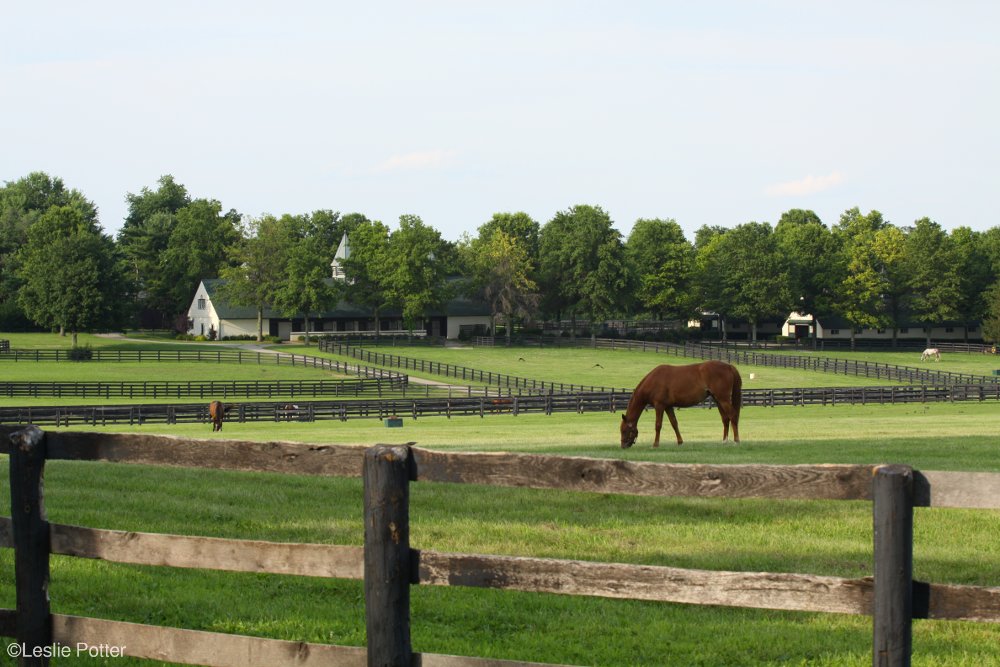
Wooden fencing. Photo by Leslie Potter
Highly visible and strong, wood fences can be expensive to install and can require a lot of maintenance. Weather and teeth can take a toll on even the most well-constructed board fence, necessitating regular repair and replacement of boards.
Horse-Safe Wire Fencing
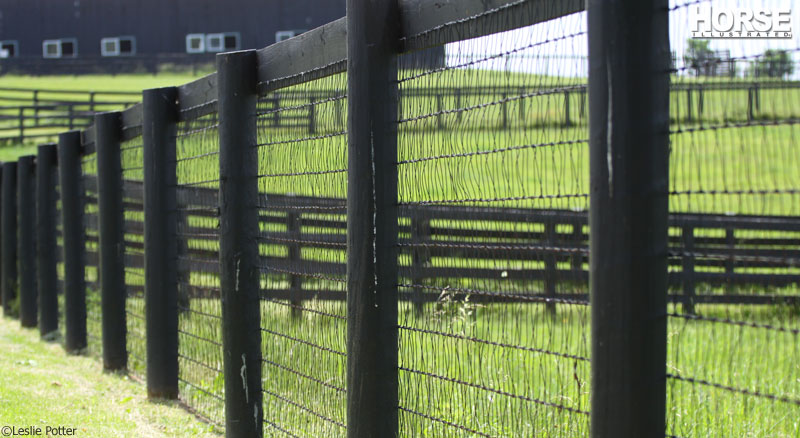
V-mesh wire fencing with a wooden top board for visibility (foreground). Photo by Leslie Potter
◆ Woven wire is one of the more inexpensive options for horse fencing, though it is recommended that the visibility of this fence be improved by using a top board or electrified tape at the top. This will also discourage horses from leaning on the fence.
◆ V-mesh wire (also called no-climb fencing) is one of the safest fencing options out there. This type of fence has a diamond pattern that makes it as effective at keeping animals out as it is in keeping horses in. The downside is cost; it is the most expensive wire fence for horses.
◆ Smooth wire fences, though inexpensive to construct, are some of the most difficult fences for horses to see; because of this, smooth wire used for horse pastures is usually coated with white PVC and used with some sort of electric (either tape or a hot strand) to keep them from leaning on it.
PVC Fencing
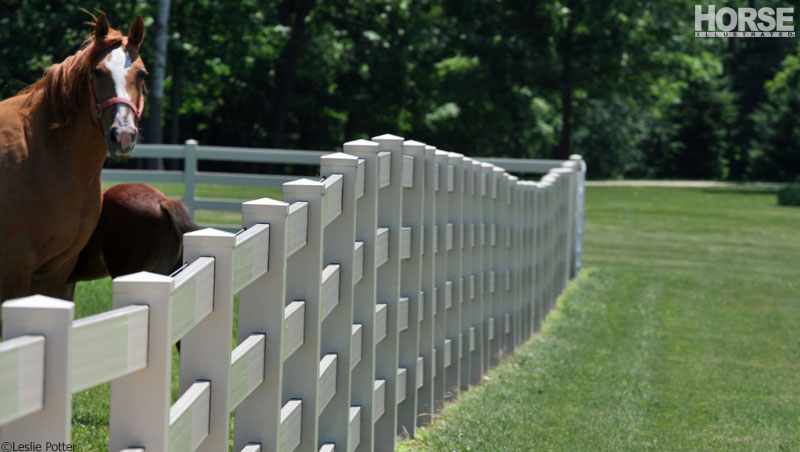
PVC fencing. Photo by Leslie Potter
While very visually pleasing, PVC fencing is extremely costly and is designed to break under pressure. It’s a good idea to use some type of electric fencing in conjunction with PVC fence as horses will soon learn that the boards will give if leaned on.
Pipe Fencing
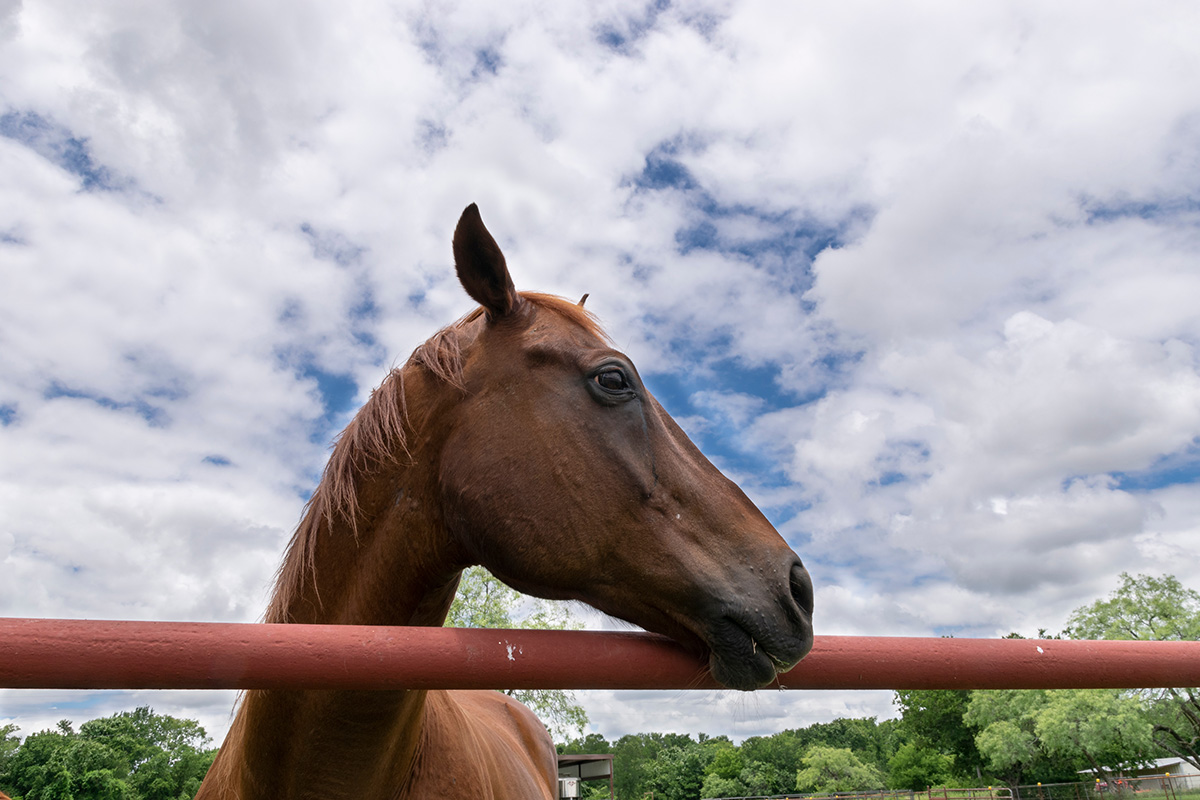
Pipe fencing. Photo by Stretch Clendennen/Adobe Stock
Though pipe steel fences are strong and durable, there is no “give” should a horse run into it. Transport and labor to install this type of fence can be high, and, once installed, modifications are difficult to make.
Electric Fencing for Horses
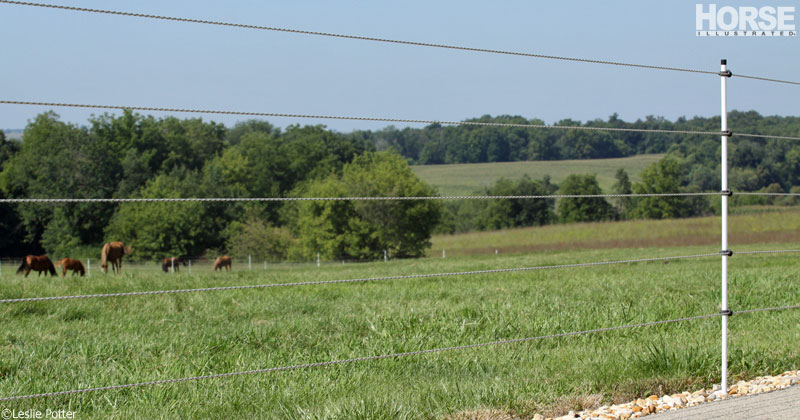
Electric fencing (braided rope/wire). Photo by Leslie Potter
Electric fencing can be used by itself or in conjunction with almost any other type of fence. Electric wire and tape are inexpensive, yet they increase the effectiveness and longevity of other fencing materials by preventing horses from leaning or chewing on them. It typically takes only one run-in with a charge to keep horses away from fencelines that are hot.
No matter what type of horse fencing you choose, the safety of your equines should be your No. 1 priority.
Further Reading:
◆ Seven Fencing Mistakes
◆ Fence Maintenance
◆ Fence Repair Checklist


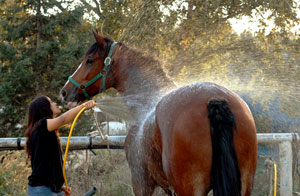
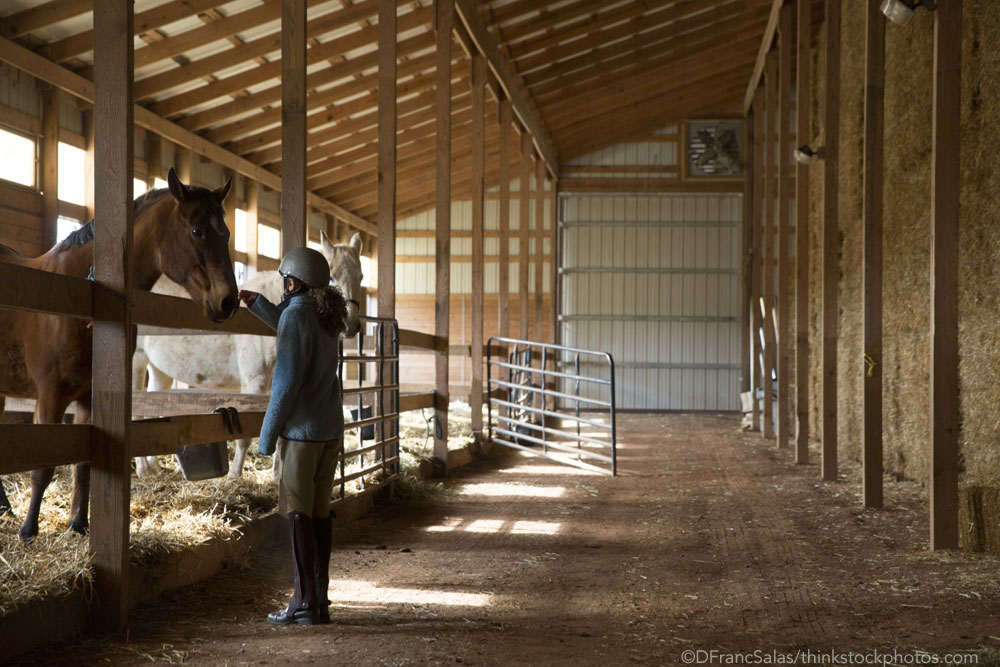

Great article. Personally, I would choose electric fencing 🙂
cool
I used to work on a stud farm in Yorkshire, England, and we used to use the French tape system really good and light and easy to put up.
I have wooden and electric fencing. I am looking to switch to Vinyl. It has a 10 year Guarantee and is durable and safe! Its not listed in the article however.
Great article. But I hate electric fencing.
Any reason that you don’t mention the RAMM, Flex Fencing?
It’s a shame you didn’t include Finish Line fencing. We have it on our farm; it’s the absolutely best horse fencing out there. Safe, easy to install, and maintenance free.
What about RAMM PVC strap fending? That’s what I have with an electric rope at the top to stop my horse from pushing the posts out. I love this stuff and I found it to be reasonably priced. Had it for 10 years and minus a little mildew (I have the white) it still looks awesome!
nice article. these fences are must for the horse yard
Not the safest horse fencing on the market, Flex Fence?
http://www.rammfence.com/fence/flex-fence-for-horses
Thanks for sharing. Is it possible to integrate the electric fence style with an automatic gate?
Stan
http://drivewaygatesforsale.com
Why does everyone forget about HDPE fencing? Check out WindRiver Fence.com
Thanks for your tips in choosing the best types of horse fencing. I recently got into farming and livestock earlier last month. Since my place is huge for all the animals I had in the farm, I was advised to install a fence for their safety. It’s interesting to know that the safest fencing option is the V-mesh wire. You noted that it is proven effective in keeping animals the animals inside the property.
It’s good to know that wire meshes can be good enough to be used for a horse fence. A friend of my uncle is convincing him to start keeping horses in his rural property. Perhaps he should first look at all the space that he has and see how feasible it will be to have horses roam freely on it.
The kinds of fences commonly used for horses include rail (plank or PVC), various forms of galvanized and vinyl coated wire, electric and combinations of these. Whatever the fence is made of, it needs to be highly visible, resistant to damage by horses, durable, attractive and safe for contact by horses.
Appreciate you sharing, great article post. Great.
I am surprised not to see traditional Cameo Fencing on this list. Sort of like a stretched nylon line. Durable, flexible, easy to install and safe – without the “cheese cutter” effect when horses slam into it – it’s also very affordable and easily electrified.
You mentioned pipe fencing but did not mention no weld styles such as the Fence Bullet System. Different weight rails can be installed to give way or bend if hit by a horse. Because connectors are used fence rails can be adjusted, added on to or replaced as needed with simple had tools.